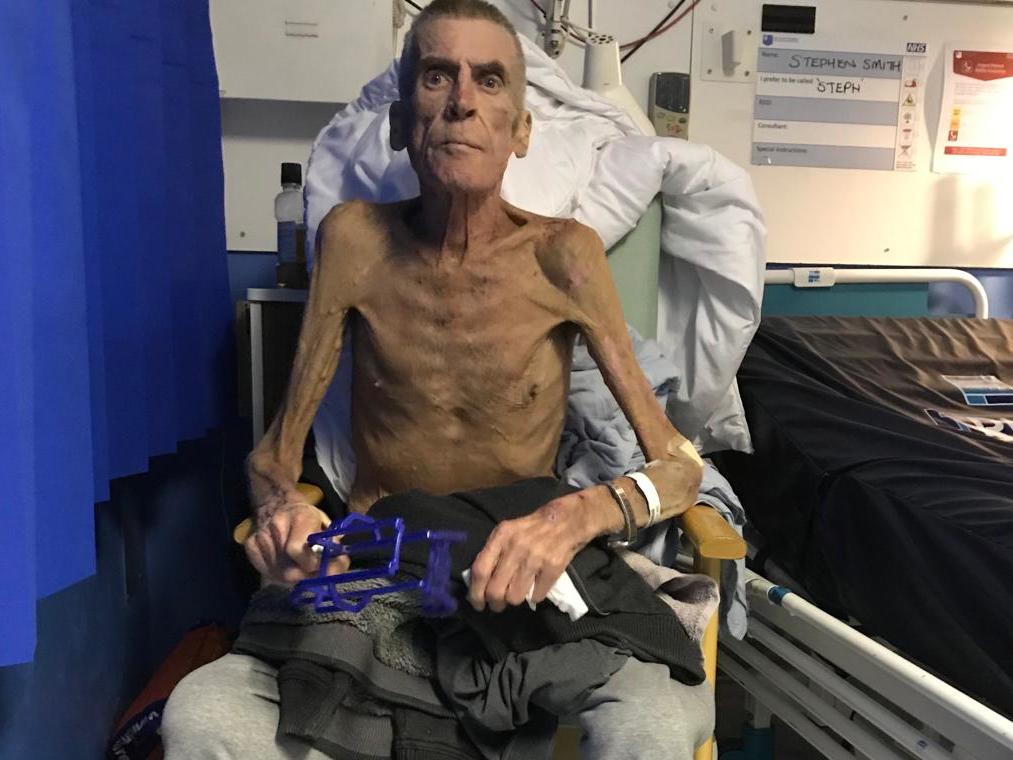‘Let down by the system’: Six-stone emaciated man deemed fit for work by DWP dies
Stephen Smith, who had never claimed benefits prior to falling ill, made headlines when photographs emerged of him emaciated in hospital after pneumonia left him unable to walk

Your support helps us to tell the story
From reproductive rights to climate change to Big Tech, The Independent is on the ground when the story is developing. Whether it's investigating the financials of Elon Musk's pro-Trump PAC or producing our latest documentary, 'The A Word', which shines a light on the American women fighting for reproductive rights, we know how important it is to parse out the facts from the messaging.
At such a critical moment in US history, we need reporters on the ground. Your donation allows us to keep sending journalists to speak to both sides of the story.
The Independent is trusted by Americans across the entire political spectrum. And unlike many other quality news outlets, we choose not to lock Americans out of our reporting and analysis with paywalls. We believe quality journalism should be available to everyone, paid for by those who can afford it.
Your support makes all the difference.A severely ill man who was deemed “fit for work” even though he weighed 6st and was unable to walk for 20 metres without collapsing with pain and exhaustion has died, prompting claims that he was “let down” by the welfare system.
Stephen Smith, who suffered from chronic obstructive pulmonary disease and osteoarthritis, made headlines earlier this year when photographs emerged of him emaciated in hospital after pneumonia left him unable to walk.
The 64-year-old Liverpudlian, who worked all his adult working life, had never claimed benefits prior to falling ill.
But he had his employment support allowance (ESA) payments stopped after a work capability assessment in 2017 found him “fit for work”.
Mr Smith – who owned a small business repairing washing machines for a living – was told to sign on to receive a £67 a week jobseeker’s allowance. He was also required to visit the jobcentre once a week and prove that he was looking for work.
Repeated calls to reverse the decision were denied by officials, despite written evidence from doctors stating that Mr Smith could not walk for 20 metres without collapsing with pain and exhaustion.
The case, first reported by the Liverpool Echo, prompted widespread outrage and a personal apology from the Department for Work and Pensions (DWP), who reinstated his benefits in full.
But months after the decision was reversed, Mr Smith has died in hospital.
Tony Nelson, director of Community Advice Service Association (Casa) in Liverpool, which supported Mr Smith with his successful appeal, told The Independent he was a “lovely man” who had “worked hard all his life”.
He said Mr Smith “had worked all his life as a small business man. He’d never used the system before – he didn’t know how to use it until he’d come to see us.”
Mr Nelson added: “He just said he was going through a bad patch. He didn’t want to disturb anyone. But it was obvious to everyone that he had problems. He couldn’t even climb the stairs.
“We had to tell him he was entitled to benefits. But when he went to get what he was entitled to, the system let him down. There was no way the system should have let him slipped through the net. And he’s not the only one. This is happening all the time. But his was an extreme case – he was suffering from so many ailments. We were able to help him out, but it looks like it was too late.”
The work capability assessment, introduced in 2008, has come under intense criticism in recent years amid claims it fails some of the most vulnerable people in society.
The Independent reported in December 2017 that attempted suicides among out-of-work disability benefit claimants had more than doubled since the tests began.
A DWP spokesperson said: “Our thoughts are with the family and friends of Stephen Smith. We are committed to ensuring that people with health conditions get the support they’re entitled to.”
Join our commenting forum
Join thought-provoking conversations, follow other Independent readers and see their replies
Comments